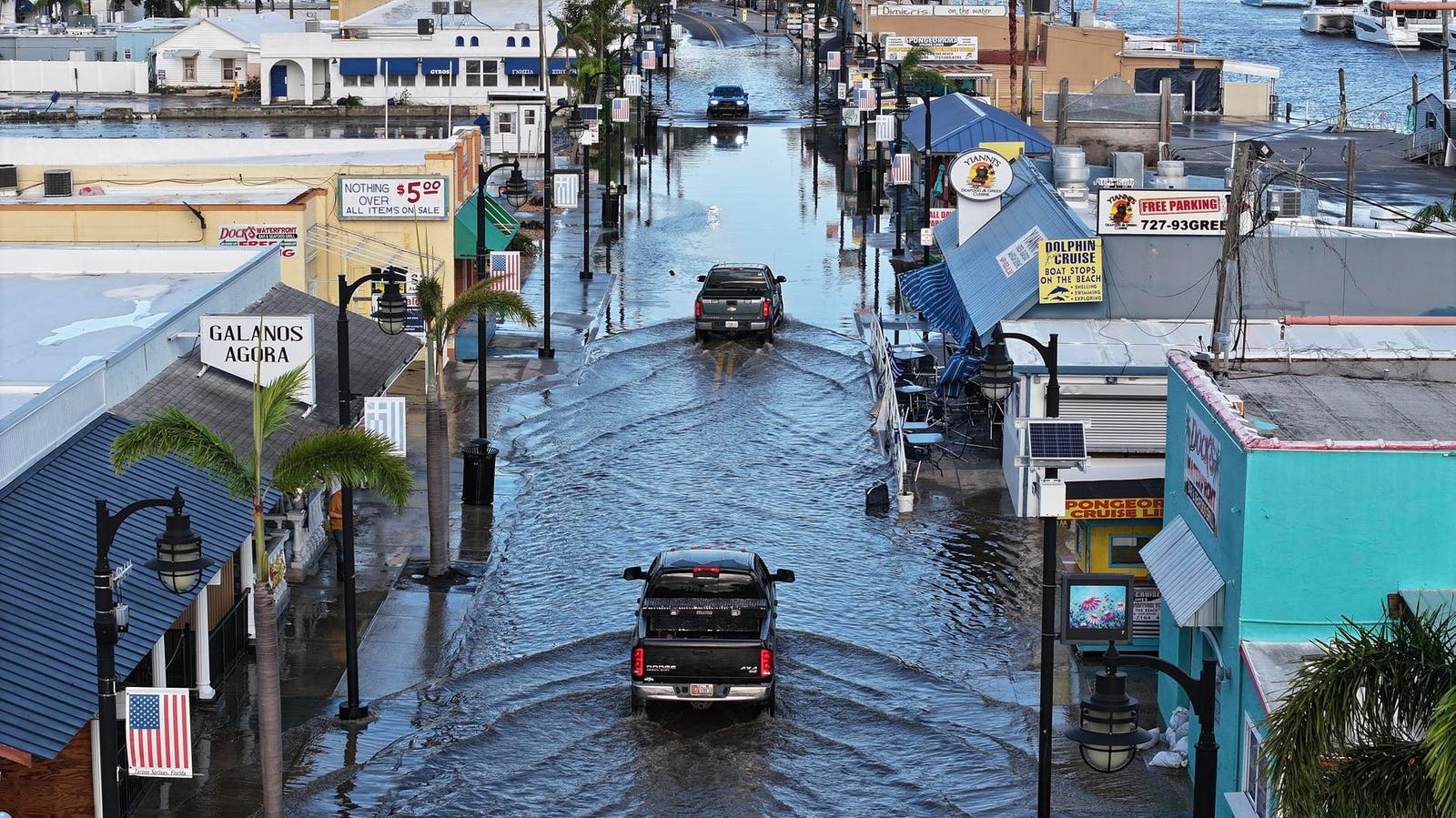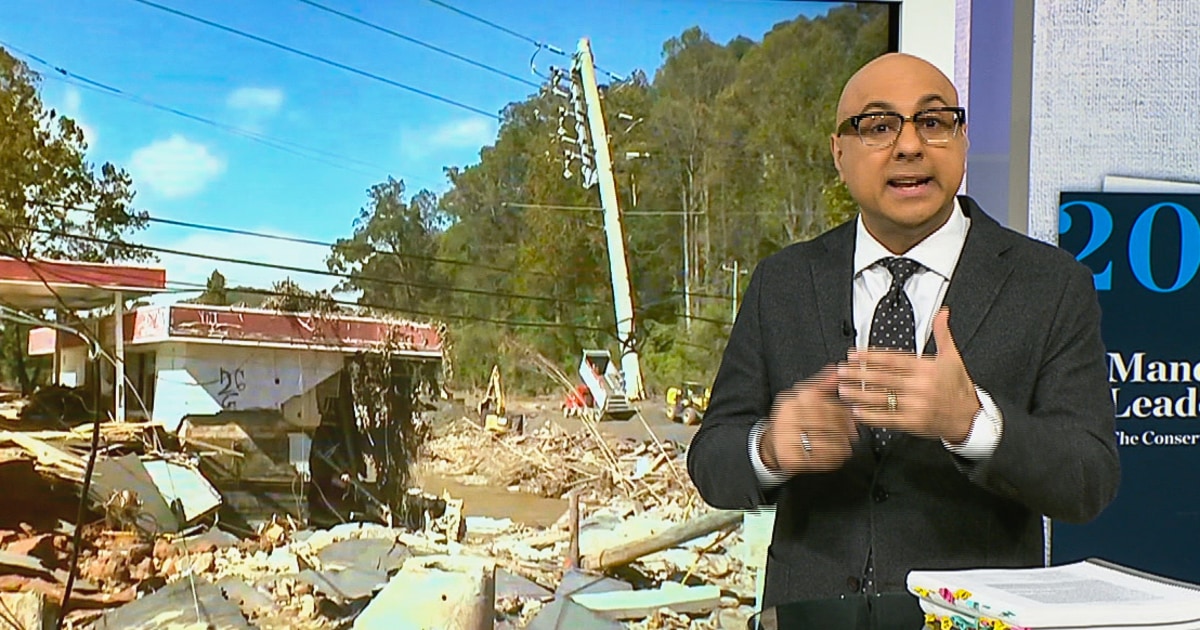Originally by Alison Durkee at forbes.com
Hurricane Milton is poised to make landfall Wednesday as communities still rebuild from Hurricane Helene, with Democrats using the devastating events to highlight the right-wing policy agenda Project 2025 and how it could gut the federal government’s weather services if former President Donald Trump wins.
Project 2025 is a blueprint for the next conservative presidential administration—namely Trump—developed by the Heritage Foundation and other third-party conservative groups, which includes a 900-page policy agenda that broadly lays out a sweeping overhaul of the executive branch and federal agencies.
Key Facts
NOAA: Project 2025 broadly calls for the National Oceanic and Atmospheric Administration—which leads the government’s weather and other research operations—to be “broken up and downsized,” claiming the agency “is harmful to U.S. prosperity” because it’s “become one of the main drivers of the climate change alarm industry” and arguing its work “could be provided commercially.”
National Weather Service: The National Weather Service, which provides weather forecasts and data across the country, should solely focus on gathering weather data, Project 2025 argues, saying the division should “fully commercialize its forecasting operations” by working with private partners, rather than providing its weather forecasts for free as it does now.
National Hurricane Center: Project 2025 doesn’t call for the National Hurricane Center to be disbanded entirely, noting that it and the National Environmental Satellite Service “provide important public safety and business functions,” but does propose that any data collected by the hurricane center should be “presented neutrally, without adjustments intended to support any one side in the climate debate.”
Office of Oceanic And Atmospheric Research: The office, which provides the research that underpins the government’s climate work, is “the source of much of NOAA’s climate alarmism” and should be downsized, Project 2025 argues, proposing that its climate change research should be disbanded and the division’s other operations “should be reviewed with an aim of consolidation and reduction of bloat.”
FEMA: The emergency response agency is “overtasked, overcompensates” for states and local governments’ lack of preparedness “and is regularly in deep debt,” Project 2025 claims, proposing the agency should be overhauled so that states and local governments shoulder most of the responsibility for emergencies, freeing up FEMA to handle “the truly catastrophic disasters in which its services are most needed.”
Project 2025 also proposes moving FEMA to the Department of the Interior or Department of Transportation—because it wants to get rid of the Department of Homeland Security, where FEMA is now housed, entirely—and wants to abolish the National Flood Insurance Program and transfer its insurance offerings to private companies.
Project 2025 points to AccuWeather as one of the private companies that has been effectively using the National Weather Service’s data to create weather forecasts, which is the model that Project 2025 believes should replace government forecasts entirely. AccuWeather said in a July statement it doesn’t agree with that position, however, saying Project 2025 referenced the company without its knowledge or permission. “AccuWeather does not agree with the view, and AccuWeather has not suggested, that the National Weather Service (NWS) should fully commercialize its operations,” Chief Executive Officer Steven R. Smith said in a statement, adding that while the company is “extremely proud of our track record of Superior Accuracy … it has never been our goal to take over the provision of all weather information.”
Contra
Trump and his campaign have publicly distanced themselves from Project 2025 as it’s garnered controversy, and the ex-president has insisted he hasn’t read the policy agenda and doesn’t have any affiliation with it. “Since the Fall of 2023, President Trump’s campaign made it clear that only President Trump and the campaign, and NOT any other organization or former staff, represent policies for the second term,” Trump campaign Senior Advisor Danielle Alvarez told Forbes Wednesday, saying his Agenda47 and the GOP platform are the only policies he’s endorsed. The agenda was crafted by a number of former members of the Trump administration, including former Commerce Department Chief Financial Officer Thomas Gilman, who wrote the chapter that includes the NOAA proposals. And Trump does have ties to the Heritage Foundation and has praised its policy work in the past. Trump would be under no obligation to follow Project 2025’s proposals if he’s elected, though people involved with the agenda have broadly claimed they believe he would.
Experts have broadly decried Project 2025’s proposals on NOAA and FEMA, believing it will make the U.S. less equipped to respond to hurricanes and other natural disasters. The agenda “would result in greater suffering, more complicated responses and greater risks across the country,” Samantha Montano, an emergency management expert at Massachusetts Maritime Academy, told The Guardian, as experts warn that while Project 2025 doesn’t want to disband NOAA and the National Hurricane Center entirely, its proposed cuts to the agency’s research and forecasting work would cripple NOAA’s ability to function. “The idea that [NOAA] could be broken up and somehow still be able to do this essential work, it won’t be possible,” Rachel Cleetus, policy director in the climate and energy program at the Union of Concerned Scientists, told PBS News. Privatizing weather reports or putting them behind a paywall would also likely mean some local governments that can’t pay would be less prepared for natural disasters, experts noted, and the change could bring in private businesses with competing interests, with Rep. Jared Moscowitz, D-Fla., pointing out to The Guardian, “What if there are business investors involved who have an interest in keeping people in their homes?” Experts also disputed the idea that FEMA’s emergency response work could be successfully shifted to state and local governments, with former FEMA administrator Craig Fugate predicting to The Guardian doing so could result in towns having to raise taxes or cut programs to raise money for relief efforts, or localities going bankrupt trying to respond to natural disasters. (The Heritage Foundation has not yet responded to a request for comment on the impact of its proposals.)
What We Don’t Know
Project 2025 uses vague language that makes it hard to discern what its proposals would actually look like in practice, University of Alaska, Fairbanks, climate specialist Rick Thoman told PBS News. It’s not clear if the call for the National Weather Service to commercialize its forecasts would mean that they’d go away entirely or just sit behind a paywall, for instance, and if saying the division should focus on data-gathering means that it wouldn’t be doing anything else. If that’s the case, Thoman noted that would affect the models that private companies use. Regardless, “the intent is clearly to cripple public weather forecasting,” Thoman argued.
What Would Trump Do About Hurricanes And Climate Change?
Trump has not explicitly proposed any changes to FEMA or NOAA if he gets elected and his campaign did not respond to a question on his views on the federal programs, though the ex-president has politicized the Hurricane Helene relief efforts and falsely claimed FEMA has run out of money because it’s giving money to migrants instead. (The agency’s disaster relief efforts are completely separate from money being used to help migrant communities.) When he was in the White House, Trump drew controversy for politicizing the agency and using a Sharpie marker to draw his own path for Hurricane Dorian, contradicting the official forecast. NOAA leadership was found to have violated ethical standards by disavowing a National Weather Service tweet that contradicted Trump’s claims about the forecast, and The New York Times reported at the time that Secretary of Commerce Wilbur Ross, whose agency controls NOAA, threatened to fire staffers for going against Trump’s false claims. Trump has broadly opposed efforts on climate change, which experts believe is leading to more frequent and intense hurricanes and other natural disasters, with his Agenda47 platform calling for leaving the Paris Climate Accord, rolling back Biden-era policies that restrict emissions and scaling up domestic oil and gas production.
The vice president has not laid out specific proposals on climate change if she’s elected president, but has broadly said her plan “advances environmental justice, protects public lands and public health, increases resilience to climate disasters, lowers household energy costs, creates millions of new jobs, and continues to hold polluters accountable to secure clean air and water for all.” Harris told CNN that climate change is “an urgent matter to which we should apply metrics that include holding ourselves to deadlines around time,” but has also reversed her previous calls to ban fracking, telling CNN she believes “we can grow and we can increase a thriving clean energy economy without banning fracking.”
Read the Original Story





